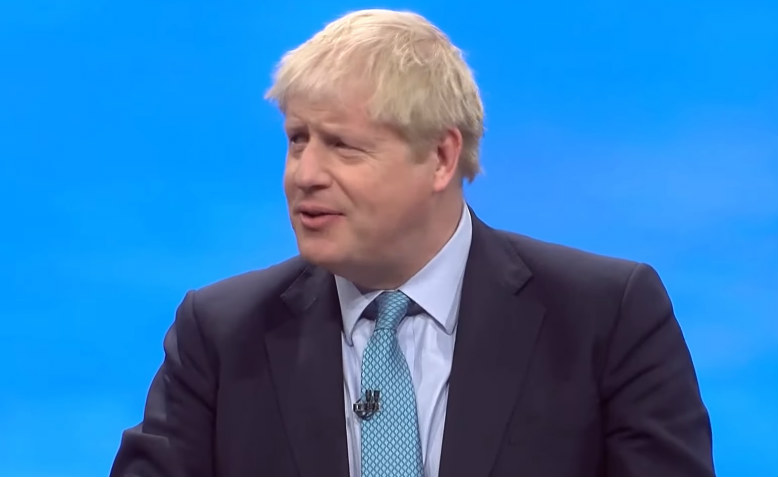 Boris Johnson speaking at Conservative Party Conference 2019. Photo: YouTube
Boris Johnson speaking at Conservative Party Conference 2019. Photo: YouTube
Conservative Party Conference revealed the Tories are weak but are relying on the Labour right to help them out, argues Katherine Connelly
Boris Johnson looks like a nervous gambler. He is betting on presenting himself as the anti-establishment warrior who will honour the democratic vote and bring the tedious obsession with and uncertainty over Brexit to an end. This is an impersonation of Donald Trump in which the archetypal establishment figure (Trump: the billionaire businessman; Johnson: Eton, Oxford, Bullingdon, Conservative, Telegraph . . .) pretends to speak up for the unheard against a widely discredited political elite. Whether or not he is allowed to pull it off will depend on the extent to which the radical promises represented by Corbyn’s leadership of Labour can be defended against attempts to drag it into propping-up, instead of challenging, that discredited elite. The stakes are very high, and we have everything to fight for.
Conservative Party Conference in Manchester should have been laughable. The Conservative Party, the oldest reactionary political party in the world, is experiencing its deepest crisis perhaps since the divisions over the Corn Laws in the 1840s – perhaps more serious. It may split – which would be a cause for celebration for everyone who recalls the miners’ strike, Section 28, the selling off of council houses, austerity, Grenfell and the ‘hostile environment’.
Despite torrential rain, the first day of the conference was greeted with an angry and noisy demonstration called by the People’s Assembly Against Austerity which showed the widespread level of discontent with this government: from trade unionists, Labour Party groups, climate change campaigners, anti-war activists and those protesting at government complacency towards Kashmir.
Then, just as Priti Patel was about to proclaim the Tories the party of ‘law and order’, the ennobled Tory MP Sir Geoffrey Clifton Brown got into a fight with the security staff for his own conference, leading to the police being called.
Finally, Boris Johnson nervously chortled his way through an evidently incoherent speech that simultaneously tried to claim to speak for those ‘being left behind, ignored’, whilst also presenting the last nine years of Tory-led austerity as a wonderful jaunt which provided good jobs, healthcare and schools and ‘cleared the wreckage [Labour] left behind’. Meanwhile (another plot twist), this happy Tory land had been blighted by ‘the evil county lines drugs gangs’ and young people turning to crime because of . . . ‘the criminal instinct’ (!).
A general election campaign which focussed on jobs, healthcare and schools would see the Tories woefully exposed as the architects of widespread suffering. Any serious investigation into the spike in violence over gangs selling drugs across county lines would see it corresponded not to an increase in “criminal instincts”, but into an increased vulnerability to exploitation of young people who have seen youth services cut, youth workers cut, youth centres cut, schools closing early because of cuts and welfare payments cut often to below the bare minimum.
How unconvincing Boris Johnson would sound saying any of this outside the conference hall.
But there were other parts of the speech where Johnson sounded less fantastical. In particular, when he pointed out that Corbyn had called for an election only for this to be ‘censored by John McDonnell or possibly Keir Starmer’. Corbyn did call for an election in his conference speech, the conference floor erupted into calls for ‘Johnson out’ – but increasingly there is pressure from other leading figures in Labour to back away from this and prioritise Brexit, from others to call for a second referendum first, from others to consider a ‘national government’ led by someone (anyone) other than the twice-popularly elected leader of the opposition. This is an appalling attack on the democratic gains made by the left and upon the democratic right to determine the government – absurdly allowing majority-free Johnson to try out posing as a democrat. These damaging concessions made to those who attack Corbyn – under the guise of expediency – should be stopped at once.
If we need further evidence for this from Johnson’s speech, we need look no further than the way he referred to the Labour Party: as ‘the fratricidal anti-semitic [sic] Marxists’. Once again, the path by which Johnson attacked the Labour Party had been smoothed by those in Labour who urged Labour to adopt the IHRA redefinition of anti-Semitism which was incompatible with solidarity for Palestine and implied that the principled, lifelong anti-racist leader, Corbyn, was in some way culpable for antisemitism.
The lesson should be clear. The high-profile attempts inside Labour to temper the radicalism of the Corbyn project and redirect Labour towards supporting a discredited political establishment are about the only things providing any fuel to a divided and weakened Tory Party. But because the hopes raised by Corbyn do represent a real challenge to the establishment, there are powerful vested interests that could be persuaded to back Johnson especially if his gamble appears to be paying off. That’s why we need to go on the offensive against Johnson now, while he is weak and his party divided.
Johnson’s agenda – saving an embattled right-wing elite – can be exposed if Labour champion a struggle for democracy. That means refusing to become a Remain party, or a national government party, it means fighting to win in a general election.

